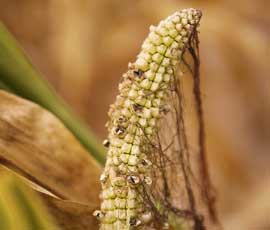Developing countries plant most GM crops

Developing countries grew more hectares of GM crops last year than industrialised countries but the USA remains the world’s largest grower, according to a new report.
Developing nations planted 52% of the global biotech crops in 2012, up from 50% a year earlier and above the 48% industrial countries grew last year, according to a report by the pro-GM International Service for the Acquisition of Agri-Biotech Applications (ISAAA).
Globally, farmers grew a record 170.3m hectares of biotech crops – up 6%, or 10.3m hectares more than in 2011.
The US maintained its position as the lead country with 69.5m hectares, with an average of 90% adoption across all crops. Canada had a record 8.4m hectares of oilseed rape at a record 97.5% adoption.
Brazil ranked second only to the USA in worldwide biotech crop hectarage, growing at a year-to-year record 6.3m hectares – or a substantial 21% – to reach 36.6m hectares in 2012 compared with 30.3m in 2011.
EU countries grew a record 129,071ha of Bt maize in 2012, but Germany and Sweden could not continue to plant the biotech potato Amflora after BASF stopped marketing it after a lack of public acceptance.
Poland stopped planting biotech maize because of regulation inconsistencies in the interpretation of the law with the EU maintaining that all necessary approvals were already in place for planting, whereas Poland did not.
“The EU region is particularly difficult to predict because the issues are not related to science and technology considerations but are of a political nature and influenced by ideological views of activist groups,” the ISAAA report said.
Of the 28 countries that planted biotech crops, 20 were developing and eight were industrial countries, compared to 19 developing and 10 industrial countries in 2011.
Sudan and Cuba planted biotech crops for the first time last year. By growing biotech cotton, Sudan became the fourth country in Africa, after South Africa, Burkina Faso and Egypt, to commercialise a biotech crop.
Meanwhile, Cuban farmers planted 3,000ha of hybrid biotech maize as part of an initiative to bolster ecological sustainability and remain pesticide free.
Julian Little, chair of the Agricultural Biotechnology Council (ABC), said: “It’s fantastic to see an increase in the number of farmers in the developing world enjoying the benefits of biotechnology, and today’s figures explode once and for all the myth that GM crops are all about big farming and big business.
“One of the major advantages of GM is that the technology is contained within the seed, and therefore is just as accessible to resource-poor small-scale cotton farmers in Sudan as it is to large-scale soy farmers in Brazil or the US.”
Biotech crops were increasingly popular with farmers because they delivered significant benefits over conventional varieties, helping farmers increase their incomes, boost yields and reduce their impact on the environment, he added.
“It therefore remains disappointing that the dysfunctional EU approvals process denies farmers and scientists the chance to unlock the potential of biotrechnologies in the UK.”
The NFU said the current regulatory process for GMs was broken and denying UK farmers the choice to access this technology.
Helen Ferrier, the union’s chief science adviser, added: “If we are to meet the challenges of sustainable intensification and become more resilient to the pressures of pests and diseases, volatile weather and declining resources we need access to the best tools and technologies.”
But GM Freeze described the report as “rose-tinted” and said it completely ignored or glossed over many key facts that highlighted the growing opposition to GM crops.
Pete Riley, of GM Freeze, said: “Globally farmers and government’s are beginning to see that GM crops are failing to deliver promised benefits and in fact are creating new problems.”
Exclusive: UK could go it alone on GM – Paterson

